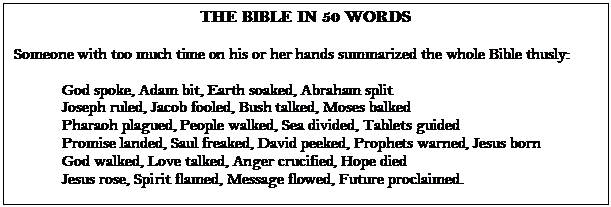A Survey of the Scriptures: Lesson 4 LEVITICUS
Holiness in Worship and Life
When was the last time you read through the book of Leviticus? Have you ever read it? This book is usually not high on the list of favorite Bible books, yet it contains many timeless principles that are applicable to us today.
Learning Leviticus:
Name: The name of the book comes from a Greek word meaning “that which pertains to the Levites.” The Hebrew name for the book comes from the first word, “and he called.” The Latin Vulgate rendered the Greek heading Liber Leviticus (Book of Leviticus) from which the English is derived.
[Who were the Levites? A descendant of the tribe of Levi, the tribe to which Moses and Aaron belonged; generally used as the title of that portion of the tribe which was set apart for the subordinate offices of the sanctuary service (1Ki 8:4; Ezr 2:70) as assistants to the priests. The Levitical order consisted of all the descendants of Levi’s three sons, Gershon, Kohath, and Merari; whilst Aaron and his descendants constituted the priestly order. They were the special guardians of the tabernacle. It was their duty to move the tent and carry the parts of the sacred structure from place to place. They were given to Aaron and his sons the priests to wait upon them and do work for them at the sanctuary services. As being wholly consecrated to the service of the Lord, they had no territorial possessions.]
Theme: holiness. Because God is holy, God’s people must be holy and their worship of God must be holy. The basic meaning of holiness is to be set apart and/or dedicated to God. The word “holy” or “holiness” is mentioned about 85 times in the book.
Leviticus goes into great detail about how both people and offerings must be perfect, without blemish. Lack of physical perfection somehow was associated with sin. Those who had diseases were banished from the camp, the place of God’s presence. Further, the offerings (sheep, doves, and cattle) had to be perfect. The spiritual significance of all this is that God requires perfection. Since man cannot be perfect, he must sacrifice a perfect substitute.
Content: Most of the book describes the Levitical sacrificial system centered around the Tabernacle. [Describe the tabernacle.] The Mosaic Law governed nearly every aspect of life in the Theocracy. [Define theocracy.] Leviticus includes laws and regulations for worship, ceremonial cleanness, morality, holy days, the Sabbath year, etc. The book contains God’s directions for Israel maintaining a right relationship with Him.
[I’m glad I don’t live under this system. No church, no shrimp, no cotton/poly blends, etc.
While it had its drawbacks, those who trusted God loved the Law and the system. Also remember that this system was the only proper way to approach/worship God. If one wanted to be right with God, he had to convert to Judaism. E.g., Ruth.
Further, as we compare the regulations of Lev. with what is currently required, we should be reminded of dispensational truth, i.e., that God has changed in His dealings with man over time and in accordance with new revelation.
Time, date, author are the same as the other books of the Pentateuch.]
Purposes of Leviticus:
A. Priests: To remind the priests who officiate before God that He must be treated as holy and honored before all the people (Lev 10:3)
B. Individual: To instruct the individual that he must come before God in worship through cleanness, atonement, and holy living
C. Nation: To remind the nation of their covenant obligations which are necessary for continued occupation of and blessing in God’s land
D. Requirements: To present his redeemed, covenanted people with a collection of religious, civil, social, moral, and economic rules in order that the Holy God may continue to dwell amid an unholy people as He continues His work through them in the world.
E. Reveal: To reveal God in His holiness, righteousness, mercy, and sovereignty
F. Model: To demand that the Israelites live in a way that would show to the neighboring nations the true nature of holiness. 1
Significance: Leviticus is referred to about 40 times in the NT. Many NT concepts are based on an understanding of the Levitical system. This is especially seen in the book of Hebrews. Leviticus also reveals important information about God’s holiness that had not been revealed up to this point.
An Outline of Leviticus:
I. The five main offerings (1-7)
II. The ordination and work of Aaron and his sons (8-10)
III. Laws of cleanness (11-15)
IV. The Day of Atonement and tabernacle worship (16-17)
V. Moral laws (18-20)
VI. Regulations for priests, offerings and feasts (21-24)
VII. Crimes and punishments (24)
VIII. The Sabbath year, Jubilee, and slavery (25)
IX. Blessings and cursings (26)
X. Vows (27)
Lofty Lessons from Leviticus:
I. Our Worship must be Holy.
A. God is Holy. 11:44, 45; 19:2
Holy means separate, set apart, sacred.
B. God is to be worshipped in a specific way. The sacrificial system maintained the faithful believer’s fellowship with God (4:20, 26, 31, 35). Forgiveness was granted based on the future work of Christ (Heb 9:26).
Some have taught mistakenly that God “covered” sin but did not really forgive sin under the OT system. This is untrue. If offered in true faith and obedience, sacrifice brought actual forgiveness and removal of guilt and punishment for sin. While forgiveness was ultimately based on Christ’s sacrificial death, the OT sacrifice did remove sin and guilt. Sacrifice in that dispensation was the only appointed means of forgiveness and fellowship with God. One could not ignore the ritual and still have a right relationship with God.
Question: Did merely working the system save anyone?
[No, one had to have a heart attitude of faith in God. Many of the rules had more to do with citizenship in the nation of Israel than with faith in God. So one could be a “good Jew” by working the system, yet not have faith in God.]
C. Incorrect worship is unacceptable to God. 22:25b
Many people have the mistaken notion that they can worship God in any way they see fit, as long as they are sincere. Yet the Bible repeatedly teaches that one must approach God in the way that He has specified. Incorrect worship, though sincere and well-meaning, is simply unacceptable. See 1 Sam 15:22.
Application: God must be revered and worshipped. We cannot approach God in any way we want. Our worship should be reverent and obedient, in keeping with God’s character and with biblical guidelines.
[Hence the character of our worship services: reverent, subdued, more intellectual than emotional, focusing on the character of God.]
II. Our lives must be Holy.
A. God’s holiness is the basis for our holiness. 11:44, 45; 19:2; 20:7-8;
It makes sense that Israel, God’s chosen people, would imitate God’s character. If still makes sense for God’s people to do so. Since God is holy, we should strive to be holy.
B. Holiness is measurable: conformity to the standard. The focus of Leviticus is an external obedience to the regulations. Obedience equals holiness. There is an external dimension to holiness. Notice the regulations in chapters 19?20. See also 1 John 2:3-6.
[There is little mention of being sorrowful for sin, of guilty feelings, of heart attitudes. This obviously doesn’t negate the importance of heart attitude. I point this out because of the modern emphasis on heart/feelings over strict obedience. People think that as long as their motivations are pure, they can do what they want. This is false. God is concerned about heart attitudes, but He is also concerned about external obedience to His commandments.
There is a danger in equating obedience to the letter of the law with salvation or spirituality. But I think the danger of laxity/apathy is equally as great.]
Application: 1 Pet. 1:15?16. There are two aspects of holiness: separation from sin and dedication to God. Both of these should be evident in the Christian’s life.
Conclusion
While the regulations in Leviticus, as part of the Law, no longer apply directly to NT believers, there are important principles that we can learn from the book. God is holy; therefore, believers must be holy. They must worship God in the correct manner and their lives should be holy.
Discussion:
1. Briefly summarize the contents of Leviticus. Laws and regulations for Israel to maintain a positive relationship with God.
2. Why do we insist on a worship style that is reverent and serious? Because our worship should reflect God’s holy character.
3. What are the two aspects of holiness? Separation from sin and dedication to God.
4. Is holiness simply keeping the rules? No, one’s heart attitude needs to be right as well. One must be dedicated to God, i.e., have a desire to maintain a right relationship with God.
What are the primary lessons of Leviticus for Christians? That God is holy, that our worship of God must be holy, and that that we must live holy lives.
- Keathley. ↩

